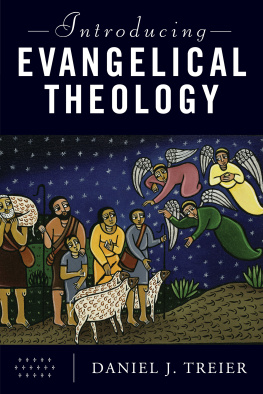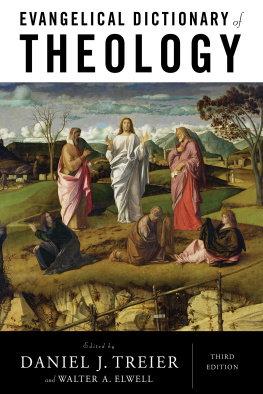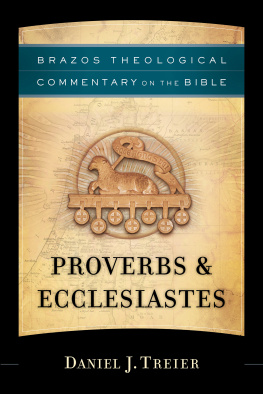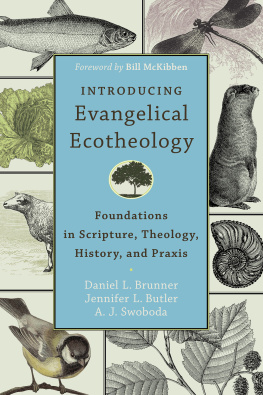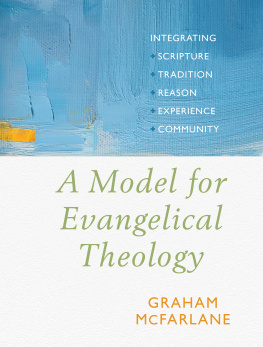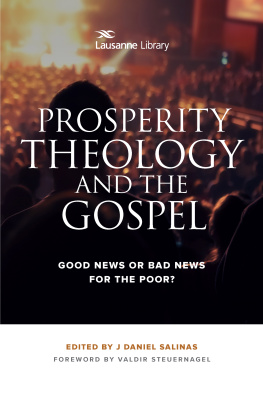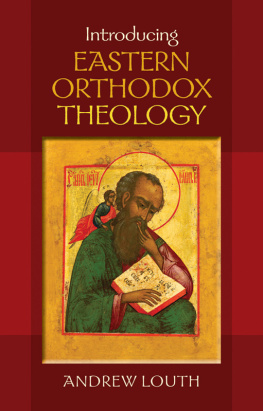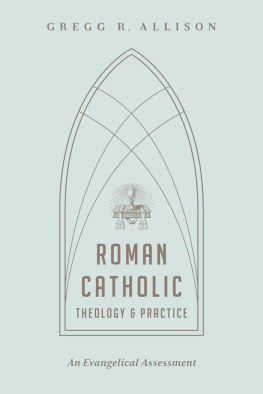Treier Daniel J. - Introducing Evangelical Theology
Here you can read online Treier Daniel J. - Introducing Evangelical Theology full text of the book (entire story) in english for free. Download pdf and epub, get meaning, cover and reviews about this ebook. year: 2019, publisher: Baker Academic, genre: Religion. Description of the work, (preface) as well as reviews are available. Best literature library LitArk.com created for fans of good reading and offers a wide selection of genres:
Romance novel
Science fiction
Adventure
Detective
Science
History
Home and family
Prose
Art
Politics
Computer
Non-fiction
Religion
Business
Children
Humor
Choose a favorite category and find really read worthwhile books. Enjoy immersion in the world of imagination, feel the emotions of the characters or learn something new for yourself, make an fascinating discovery.
- Book:Introducing Evangelical Theology
- Author:
- Publisher:Baker Academic
- Genre:
- Year:2019
- Rating:3 / 5
- Favourites:Add to favourites
- Your mark:
- 60
- 1
- 2
- 3
- 4
- 5
Introducing Evangelical Theology: summary, description and annotation
We offer to read an annotation, description, summary or preface (depends on what the author of the book "Introducing Evangelical Theology" wrote himself). If you haven't found the necessary information about the book — write in the comments, we will try to find it.
Introducing Evangelical Theology — read online for free the complete book (whole text) full work
Below is the text of the book, divided by pages. System saving the place of the last page read, allows you to conveniently read the book "Introducing Evangelical Theology" online for free, without having to search again every time where you left off. Put a bookmark, and you can go to the page where you finished reading at any time.
Font size:
Interval:
Bookmark:
Treiers Introducing Evangelical Theology treats the gamut of evangelical theological categories. He seeks to maintain Scriptures preeminent place as the authoritative source for theological formulation and its evaluative power for faith and practice. In the course of engaging theological and social questions and issues inside and outside the church, Treier consistently demonstrates a respect for centuries of church theological reflection done by sinful people who received the grace of Holy Spiritempowered reasoning. This volume will no doubt become a standard work for the theological training of professional and lay church leadership.
Bruce Fields , Trinity Evangelical Divinity School
Alert to theologys doctrinal, moral, and spiritual dimensions; deeply informed by classical and contemporary approaches to the matters at hand; and irenic in its survey of a broad theological landscape, Treiers Introducing Evangelical Theology offers a faithful and creative account of Christian teaching that both students and teachers will appreciate and that further distinguishes the author as one of our most gifted theologians.
Scott R. Swain , Reformed Theological Seminary, Orlando
Introducing Evangelical Theology is biblically rooted, historically informed, ecclesially located, and spiritually formative. While readers will not agree with every conclusion, Treier has given us an introduction to Christian theology that is eminently accessible, richly stimulating, grounded in the Christian tradition, and committed to evangelical distinctivesa rare feat. This book will benefit students, pastors, and academic theologians alike.
Matthew Y. Emerson , Oklahoma Baptist University
In making introductions, first impressions count: according to a Harvard study it takes only seven seconds to size up a new acquaintance. Introducing Evangelical Theology makes a good impression in the first seven pages, where we meet a movement that is equally concerned with intellectual, moral, and spiritual formation; ecumenically orthodox and rooted in the great creeds; yet distinctly Protestant in its insistence that the gospel retain its glorious freedom to renew and reform. By the end of the book, readers will also have formed a good lasting impression of evangelical theology and an appreciation for Treiers clear, fair, and winsome exposition of the trinitarian narrative of the gospel and its interpretive traditions. Each chapter includes theses, definitions of key terms, and a set of learning objectiveseverything one needs to learn the grammar of evangelical faith. This is not simply an introduction to but an education in evangelical theology, and one to which I will be enthusiastically introducing students for years to come.
Kevin J. Vanhoozer , Trinity Evangelical Divinity School
In these pages Treier offers a truly remarkable combination of Scripture, tradition, ethics, doctrine, historic debates, and contemporary challenges as he explores one essential topic after another. Trinitarian in both content and structure, the book could not be more thoughtfully ordered and presented. I know this books pages will be dog-eared and its binding worn by many a college student, pastor, graduate student, and academic, for whom it will quickly become an invaluable and treasured resource.
Kristen Deede Johnson , Western Theological Seminary
What a great teacher! Treier is a master of summarizing the expansive, explaining the complicated, and highlighting the central. Here we encounter an invitation to experience the breadth of the Christian tradition while standing within the best of the spirit of evangelical theology. Treier is fair, judicious, generous, and wise. Learn to theologize like him not only for the good of your heart but also for the good of Gods church and world. This volume will surely be a great gift to a generation of readers.
Kelly M. Kapic , Covenant College
2019 by Daniel J. Treier
Published by Baker Academic
a division of Baker Publishing Group
PO Box 6287, Grand Rapids, MI 49516-6287
www.bakeracademic.com
Ebook edition created 2019
All rights reserved. No part of this publication may be reproduced, stored in a retrieval system, or transmitted in any form or by any meansfor example, electronic, photocopy, recordingwithout the prior written permission of the publisher. The only exception is brief quotations in printed reviews.
Library of Congress Cataloging-in-Publication Data is on file at the Library of Congress, Washington, DC.
ISBN 978-1-4934-1677-6
Unless otherwise noted, Scripture quotations are from the Holy Bible, New International Version. NIV. Copyright 1973, 1978, 1984, 2011 by Biblica, Inc. Used by permission of Zondervan. All rights reserved worldwide. www.zondervan.com. The NIV and New International Version are trademarks registered in the United States Patent and Trademark Office by Biblica, Inc.
Scripture quotations labeled KJV are from the King James Version of the Bible.
To my daughter, Anna.
May you continue to radiate joy
as you grow in the grace and knowledge
of the Triune God (2 Pet. 3:18).
Cover
Endorsements
Title Page
Copyright Page
Dedication
Acknowledgments
Abbreviations
One Carries It Around Within Brett Foster
The Nicene Creed
Chapter Theses
Introduction
Part 1: Knowing the Triune God
1. The Creed: Faith Seeking Understanding
2. The Ten Commandments: A Communitys Moral Formation
3. The Lords Prayer: The Churchs Spiritual Formation
Part 2: The Father, the Almighty Lord
4. The Triune Name of God
5. The Character of Providence
6. The Goodness of Creation
7. Human Beings
Part 3: The Son, the Mediating Logos
8. The Identity of Jesus Christ
9. The Ministry of Reconciliation
11. The Gospel in Christian Traditions
Part 4: The Holy Spirit, the Life Giver
12. Gods Empowering Presence
13. Scripture
14. Church
15. All Things New
Glossary
Bibliography
Scripture Index
Name Index
Subject Index
Back Cover
T he roots of this book begin with the seeds of biblical faith that my parents and grandparents planted in my formative years. Professors and peers nurtured this faith in my young adulthood. Mentors and friends have constantly strengthened its roots. Deep thanks to the many people who pray for me and support my vocation. This particular project received helpful exhortations and vital encouragement from Michael Allen, Mark Bowald, Kevin Hector, Beth Felker Jones, Kelly Kapic, Timothy Larsen, Scott Swain, and Kevin Vanhoozer.
Thanks to friendly colleagues, faithful students, and supportive administrators at Wheaton College, who have helped me to find my theological voice; needing special mention from the past are Jeff Greenman, Mark Husbands, Alan Jacobs, Roger Lundin, Mark Noll, Dennis Okholm, and Ashley Woodiwiss. Seventeen other colleagues joined me in a survey course on Christian doctrine during 201415, funded by the Faith and Learning program. Their gracious interaction made the present book much better than the teaching notes that legions of students previously encountered.
The book also improved thanks to Sunday school interaction at my home church, Immanuel Presbyterian in Warrenville, Illinois, where we have tackled material from the first few chapters. For a decade, Pastor George Garrison has faithfully proclaimed the primacy of Jesus Christ, which I hope has left a mark on this book. In addition, the Creation Project Regional Discussion group at Trinity Evangelical Divinity School prompted me to revise the sixth chapter; Sharm Davy, whom I met at an Evangelical Theological Society meeting, challenged me to revise the treatment of angels and demons; and Tom McCall graciously answered my eleventh-hour plea for troubleshooting on the doctrine of sin and refinements regarding Wesleyan theology.
Font size:
Interval:
Bookmark:
Similar books «Introducing Evangelical Theology»
Look at similar books to Introducing Evangelical Theology. We have selected literature similar in name and meaning in the hope of providing readers with more options to find new, interesting, not yet read works.
Discussion, reviews of the book Introducing Evangelical Theology and just readers' own opinions. Leave your comments, write what you think about the work, its meaning or the main characters. Specify what exactly you liked and what you didn't like, and why you think so.

